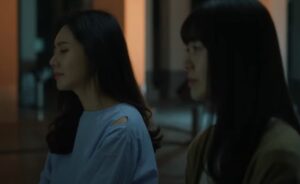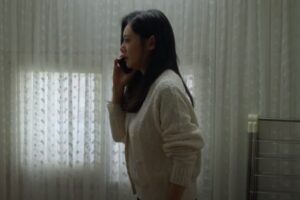
Green Mothers’ Club is a drama about a neighborhood shrouded in secrets as the mothers struggle to keep up immaculate appearances. Its second half pivots from the previous focus on the pressure of academic success on children to the revelation of their parents’ hidden lives. As their lies begin to fall apart, so does the previous hierarchy of the mothers’ club. Characters must suddenly decide whether to continue with their deceptions in order to fit in, or finally take off their masks. Although its second half was not perfect, Green Mothers’ Club tackles some difficult subjects like mental health, divorce, and the pressures of keeping up appearances.
This review contains spoilers for episodes 9 to 16 of the drama.
In Green Mothers’ Club, everyone is hiding something to keep up their flawless images, regardless if it makes them happy or not. Chun-hui (Choo Ja-hyun) starts off the story at the top of the tier in her mothers’ group. However, it is later revealed that she made a deal with her current husband, agreeing to take the blame for the death of a patient, in order to become his wife. Despite that she proudly talks about her husband, Chun-hui secretly resorts to illegal drug distribution in order to make up for his gambling problems. Similarly, Yeong-mi (Jang Hye-jin) is married to a writer working on a big movie deal, a fact that she readily boasts about. Unfortunately, she is hiding his abusive nature towards her children. It is clear these mothers care more about having a reputation to brag about, rather than the happiness and safety of their children and themselves.

Chun-hui falls to the bottom of her mothers’ group, but she manages to re-establish her relationship with Eun-pyo (Lee Yo-won) through their similar decisions to care for their child’s mental health. In the first half of the drama, we saw both mothers compete against each other as they forced their children to go to cram school and study constantly. Unfortunately, Dong-seok (Jung Si-yul), Eun-pyo’s son, develops selective mutism and Yu-bin’s (Joo Ye-rim), Chun-hui’s daughter, becomes a compulsive liar. This development shows both mothers actively taking care of their children’s mental health, prioritising this over any criticism they may face for seeking therapy. In doing so, Chun-hui in particular begins to reassess her own life and choices, ultimately deciding that being in a loveless marriage and distributing illegal prescriptions was no longer worth it. Chun-hui gives Eun-pyo a call after finally leaving her husband, which is a pivotal moment in her character’s arc:
I’m sorry I had to leave so abruptly. I’m thankful for everything you did for me. Eun-pyo, I wish you a happy life. Let’s live a happy life no matter what.
Eun-pyo herself is a flawed character who initially sacrificed her son’s mental health for the sake of her fitting in with the other mothers. She quickly learns she was in the wrong in doing so. This change in her priorities also leads her to deal with her own insecurities regarding her education and the career she lost. In the end, Eun-pyo gives up her job as a lecturer and becomes an art school teacher for kids. While the scene is a short one, we see Eun-pyo laughing with the children, and she seems to have finally sought out out her own happiness as Chun-hui advised her to.

Green Mothers’ Club has a great focus on the pressures that society places on both parents and children. However, it throws in a twist that seems unnecessary. Halfway through the series, everyone is shocked by Jin-ha’s (Kim Gyu-ri) apparent suicide. The details revealed about her life seemingly point to other characters having a hand in her demise. However, the twist is that her husband Luis Bunuel (Roy) was in love with his adoptive sister, who happens to also be Jin-ha’s doppelgänger. In order to run away with his sister, Luis lets go of Jin-ha’s hands, causing her to fall to her death. It is unclear why Luis did not just seek a divorce. As a French-born Korean, he had no friends or relatives in Korea, and was planning to move back to France. As such, he did not have a reputation to worry about if he simply left Jin-ha. Overall, the great revelation seems like cheap reasoning for Jin-ha’s death, and does not tie back into the central theme as well as the other parts of the story.
The truth about Jin-ha’s death does little for her character’s arc. On the outside, she had a seemingly perfect marriage and life, but little by little, we learn more about her past and current secrets. There was still much, as viewers, that we did not know about Jin-ha, but it was implied that she was jealous of Eun-pyo’s relationship with her mother. While Eun-pyo purely saw Jin-ha as competition, Jin-ha was struggling with her own mother’s death along with her resentment against her stepmother. It is sad to see her lose her fight against her mental health, and unfortunate that she was not able to seek out professional help before her death.

Despite its disappointing twist, Green Mothers’ Club is still a well-made drama in its themes about mental health and the pressures of society. In the end, we see several characters finally making choices for themselves and their own happiness, as opposed to acting to appease the judgmental eyes of society. Eun-pyo, as the main character, was not a perfect mother, but we see her grow and learn from her mistakes. In doing so, she reaches out to other mothers, gives them forgiveness, and inspires them to also take control of their lives for the sake of their children and their own happiness. Green Mothers’ Club had a bittersweet ending, but it was a story criticizing the real pressures of academic success and portraying the struggle to keep up an immaculate image as a mother. The message behind this drama is that no mother may be perfect, but they can still try to do the best for their children and themselves.
(Images via Netflix and JTBC)


